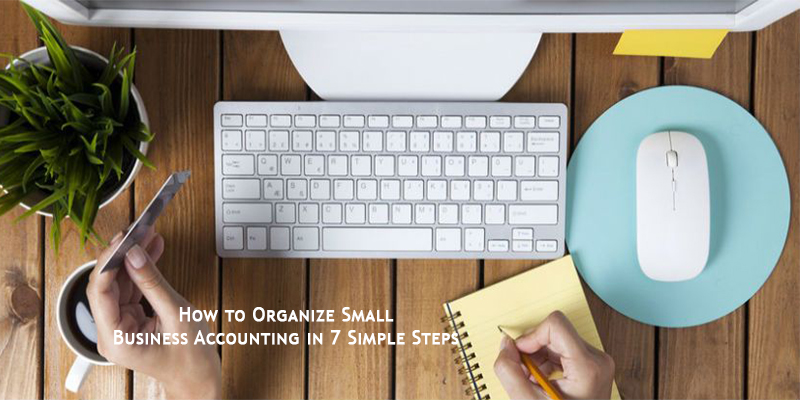Speaking of How to Organize Small Business Accounting in 7 Simple Steps, As a small business owner, setting up an account to track your money flow and transactions is very important, as this helps you to record, and analyze all financial transactions such as purchases, sales, payments, liabilities towards maximizing your business.

It majorly involves accounts of tax and its returns, financial reports, and bookkeeping. Understanding how this works is very important for you if you have a business, follow with rapt attention as this is the main focus of this article.
How to Organize Small Business Accounting in 7 Simple Steps
To organize a feasible accounting system for your small business, there are very important steps and processes you ought to know. They may seem complicated but very simple, we will give you the 7 major processes to follow. You can check them out below:
- The first thing you have to do is to create a bank account towards this i.e a business account where all your business transactions will be kept, and a savings account in case of incidental/unforeseen expenses.
- The next thing to do is to make sure you have a recording system for your transactions which may involve finances, preparing financial statements, and tracking deductible expenses such as tax, invoices, checks, purchase orders, and so on.
- Now you must decide the type of accounting method you desire. Basically, they split into two i.e accrual which needs a 2-way entry to record transactions and the cash-basis method which records income and expenses when cash is paid or gotten.
- Then make sure you create a properly set-up trial balance in order to have a detailed record of all debits, credit, income, and expenses activity. This helps to have a good balance of your money received and expended in the long run.
- Proceed to have a financial statement for the transactions which will include how money flows, income generated, and balance sheet.
- You can now make sure your temporary accounts, the same as the ones for all income and expenses are restarted and closed with zero amount to have a fresh financial cycle.
- Finally, make it active by starting transactions.
Note that if you don’t grasp/don’t have time for the aforementioned processes, you can use accounting software such as “cloud-based” to do it for you.
Tips to Keep Your Small Business Accounting Organized
It’s not just about just having an accounting system for your business, but how you can maintain it. If that’s your issue, there are necessary things to put in mind.
They are:
- You must not use the same account for your business and personal transactions, you won’t be able to keep track of transactions and it will cause a flop.
- Have a financial tracking system to monitor cash flow entry and exit.
- As earlier stated, you can make use of small business accounting software to put the stress off you.
- You can get an expert in accounting, like a professional accountant who can help you with taxes, business deductions, and so on.
- Your accounting paperwork must be properly kept in a filing manner, you can also do this electronically by having a separate e-folder for it.
More research can be done on Google.
What is the Simplest Accounting Method?
Cash accounting is the simplest accounting method. This is because it focuses on the inflow and outflow of finances. It is simply used for personal finance analytics and small business finance evaluation.
Is there any Accounting for Dummies?
Yes, there is accounting for dummies, in fact, it is called accounting for beginnings. It is the perfect start for every beginner. Whether you need it for a family budget, small business finance analysis or you want to raise a professional in your cooperation, this is the best start for you.
Is Accounting Hard with No Experience?
Well, it is very difficult to accounting job with no experience. Many employers want a candidate with good experience and will not be willing to hire any with little or no experience at all. However, with a bit of creative thinking, you can convenience the employer to give you a chance.
What is Accounting’s Biggest Weakness
Some of Accounting’s biggest weaknesses include:
- Poor time management.
- Lack of good communication skills.
- Inability to see the big picture.
- Stubbornness.
- Cautiousness and lots more.
What is the Key strength of an Accountant?
The major key strength of an accountant is having a strong desire to learn and also excel or determine to solve problems. When faced with a big problem, accountants hold on to patients and commit themselves to ensuring the problem is solved on good grounds.
CHECK THIS OUT:



